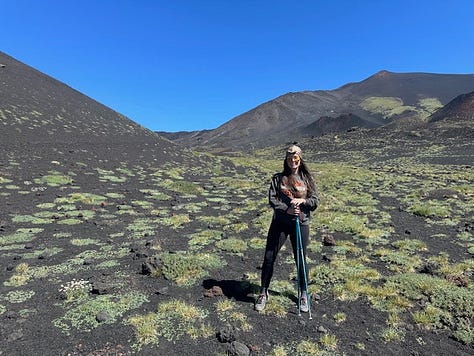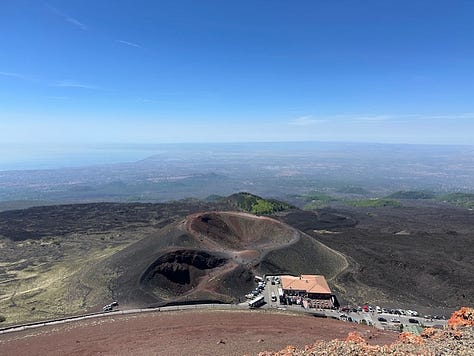When it doesn't feel good anymore...
Letter #80: Why I left my old career, and a quick intro to my new career
5/21/24
I’m not sure what made me so positive I wanted to be a fashion designer when I was younger. It was likely the affirmation I received from my peers, family, and teachers at school. I excelled in art classes, especially metal-smithing and anything crafty. Around age 12, I learned to sew using my mom’s old Singer. Around age 16, I began making clothing and jewelry for myself and friends. I’d frequently see others wearing designs of mine around school. It felt only natural to pursue a degree in art where I could make a living designing commercially—I knew I wasn’t innovative or ground-breaking enough to make it as a fine artist. I was excited at the prospect of seeing more and more individuals wearing my designs as a form of self-expression.
And finding success in the commercial fashion world I did. I was hired as a junior designer after hunting anywhere and everywhere in New York City for a job, only 10 months after I’d arrived in 2012. The money wasn’t enough for a few years. I still worked a bar job to afford rent, my student loan, and a modest NYC lifestyle. But eventually it all evened out and I was able to level up, move up, gain promotions and raises.
When I was first moving to NYC from my college years in Minneapolis, I was dead set on one day leading a glamorous, designer-clothing laden lifestyle. My dream of what the city offered was a mash up of whatever I was seeing in TV shows, movies, and celebrity magazines. I trusted that one day I’d be walking down the street, a spitting image of Carrie Bradshaw, perfectly chic and outfitted for dinner at a trendy SoHo restaurant with my best friends, and we’d all live happily ever after.
And I did chase after that dream for several years, changing my apartment every couple years, choosing something more expensive, yet more aesthetically pleasing, an action that further tethered me to my salaried position. I was much worse about shopping in my first few years in NYC, dipping into and out of the commercial fast fashion stores like Zara and H&M, looking for trends that I’d be sick of by the following year, maybe even the following season.
I learned a lot in my first few years in New York. How to be a professional, how to negotiate, how to meet deadlines. I learned from the managers above me how I would and would not want to lead a team in the future.
I learned the game of costing, the game of numbers. How to identify your margin, your target retail, and work backwards, designing into and negotiating against the manufacturers of our product. Most times I got my way. Sometimes I did not and I had to scrap the idea.
I learned to be tough in my requests and stand my ground, demanding and later pleading with the manufacturers to defy all reality of time to get our goods from China to the US in a matter of weeks, sometimes days.
I learned to get the manufacturers to agree to re-make an order when something about it got screwed up—even if the mistake was our fault. I engaged in a constant tug-of-war, of constant compromise, with me knowing that most likely I’ll have the upper hand as I was directing the goods to the American consumers, always hungry for more. As we all know, cash is king, and I worked for the king.
I went over to China several times to work closely with the factories. I was already well traveled (although there is much of the world I still have to see), so I’d like to say not much shocks me, although I still find myself very curious about what I see when visiting foreign cultures. If anything, I’m fascinated.
I remember pulling up to a factory for the first time, on my very first visit. It felt depressing to me (realizing, I know, that I am speaking about others’ reality). Soviet-era like bloc dormitory housing loomed right across the driveway from the factory’s main building. Laundry hung gloomily from the dorm windows and my imagination began to run wild—people live here? At work? In America we live in dormitory housing for college…but that is a time to make new friends, discover one’s self, party, procrastinate, and beg our parents for pizza money.
The dorms at the factory level in China were a way of life, a grateful opportunity to make money and send it back home to one’s family. I was dumbfounded as I got out of the sleek, black Suburban, vaguely listening as the driver scheduled a time to pick us up again. I asked one of the American agents traveling with us “are the workers happy?” His response was “Heather, you can’t ask questions like that. It’s not an apples to apples comparison to the U.S.” It made me confused and sad.
We were greeted with a flurry of fuss, our hosts ensuring we felt welcome and had everything we needed—water, snacks I didn’t recognize, a clear path to the restroom, the WiFi password. And I did feel very welcome. I was repeatedly expressing my gratitude for how graciously the manufacturing’s management team took care of us.
My heart softened as we worked together. Now the Americanized names of these Chinese colleagues had actual faces attached to them—stylized clothing, haircuts, glasses, shy smiles, muted laughter in meeting the Americans they worked with daily over the glare of the desktop screen.
As much as I was there to get work done, I wanted to spend time developing relationships with these colleagues as well. I wanted them to like and respect me. I wanted to demonstrate how honored I was to have a seat at that table, that I respected them and all their hard work, too.
And, yet, now knowing on a more intimate level who I was negotiating with made my job harder. The head manager of the team was too tender for his role. I met his wife and his two young daughters over dinner one night, the girls providing me an expert tutorial on how to suck the meat and skin off a chicken foot, one after the other 😮. They ate them like candy, laughing as I struggled to mimic their behavior.
His family was incredibly warm and grateful to me for our continued years of partnership, knowing that we both helped each other maintain a comfortable lifestyle back home. If anything, I wanted to elevate his position, and all those that worked with him, but I knew that was not in my power.
Once back in NYC, the images of the factory workers living in the dormitories sat muddled in my mind. The women, hunched over sewing machines, collectively whipping out 500,000 pieces of the same pair of underwear over and over. A Monday through Saturday work week. The unending haze of yellow smog that hangs over the land, pollution that will never leave.
My mind wandered to how flippantly I could make a change to a design without having to deal with the frustration of the manufacturer. Sure, we could draw it, but they were ones actually bringing it to life. A technician recreates the design in a software program, which tells the seamless knitting machine (for seamless apparel, my specialty), which tube design to create, the cutters cut, the sewers sew, and the Americans receive and sell their creations. The manufacturers were the true artists, and yet they bobbed and weaved through every demand and change I made, no matter how major, minor, or unrealistic.
I knew many of the workers didn’t see their families for an entire year, going back only during Chinese New Year for a month or so (a time we lamented back at the office for lag time in receiving our goods). Some workers never returned to the job. I was troubled at the notion of opportunity and circumstance—why was I on one side of the computer, pecking away my orders for the late-stage capitalist American consumer…but I would never dream of having to live AT work? Why do some of us end up in one place of privilege, and others in the complete opposite side of the world?
As COVID times hit, demands of lowering our prices only increased. I’d exchange several emails back and forth with the manufacturer’s manager, pleading with him that surely he could shave off another 5 cents, providing me with a lower price for the same exact product from the previous year. I had a margin goal to hit, a raise I “needed”, and I was willing to hit the “send” button on that email, knowing I was contributing to the cyclical problem of consumerism that, while I was pretty ignorant of when I first stepped foot in NYC in 2012, I was now fully aware of 10 years later.
Even after the manufacturer’s manager sent response emails that business was already strained given the world’s current state—ships stalled months out at ports, goods backed up, workers working in odd shifts so as not to spread the disease—all it took was one call from the “big man” at our office and I typically got the price I needed.
I’m not sure who paid the price to hit the goal, but I knew what I was doing didn’t feel good. I couldn’t help wonder if my demands only made the lives of the workers living at the factories more difficult, more stressful, or more depressing (from my American perception).
Things only grew more challenging at work with pricing from the consumer side, as well. Where we once had booming business during COVID, our product holding it down on shelves in many of the deemed “essential” retailers, once the world opened up again and the stimulus checks began to dry up, we had to fight harder to gain the consumers’ attention.
How do you convince a person who’s likely already living in poverty to spend what little money they have on one of your name brand sports bras instead of baby formula or diapers? No joke, some of the conversations we had at work to win back the dollars of consumers making far less money than any one of us was felt like a cruel game.
Here I sat in the middle, asking workers living next door to where they work to cough up an extra 5 cents so that I can hit a margin goal for my manager, whereas on the other hand, asking poorer American consumers to use what little money they have left after they pay taxes on name-brand shit they don’t need?
As a designer, was I really making an impact on how others self-express and helping to build their confidence? And was my involvement in athleisure helping the wearers of my product lead healthier active lifestyles?
Probably not to any of that. The mission I had set early on in my journey into fashion design had been swallowed up by the immoral nature of capitalism. There’s not enough to go around for all of us to take a stab at making it—it’s turned into a system held by a powerful few, and produced by many that are saddled down by our own financial problems, a result of the same consumerism that we turn around and sell to our fellow workers, with a blind disregard for who’s affected by our behaviors overseas.
The “necessary” evil of branding and marketing for goods that falsely promise happiness has troubled me for a while now. I was fully involved in the toxic cycle of consumerism that keeps the American capitalist beast well fed.
It was making me sick over time. I was miserable going to work and being in such a competitive environment.
My own behaviors in how I shop changed over time. I rarely, if ever, will display a brand across my chest. I shop once in a blue moon, and if I do, it’s typically at vintage stores. Sometimes I drift in and out of smaller shops when I travel, looking for the rare items that put together my unique look, my own work of art. I don’t feel wealthy enough to be extremely conscientious of where every item of clothing I buy is made, or how it’s made (at least that’s the justification I give myself for now), hence the reason I look for vintage more than anything else. And, unless an item really “WOWs” me, I fight the urge to feel like I need new “things” in my life in order to be happy.
Actually, living out of a suitcase is the perfect way for me to further my minimalist lifestyle. I’m challenged to continue putting my few pieces together in different ways, constantly reinventing my look.
My heart hasn’t wanted to go back into consumer goods, back into fashion design. Sadly, that dream that developed throughout my adolescent years and into young adulthood has been put to rest.
I can’t convince myself that it’s important anymore to myself or to the world. The magic has disappeared for me, and it’s been replaced with a much clearer, more simplified vision.
When asked while I was traveling if I would go back into fashion when I returned to work, I would let people know that no, and I wasn’t even interested in working for a sustainable fashion brand. That I was done with fashion for good. That I wanted to do something in service for people. To do something where I was giving back to the community, something intangible, something that would never end up in a landfill.
Something that was making the lives of others inherently better, something that wasn’t hurting anyone. It became my new mission in 2023, and I just had to trust that my skillset as a designer would somehow translate into a different industry, one of service to the community.
11/09/2024
And it happened. I won’t dive in deep here, as I introduced it back in February, 2024, but I’ve been running the operations and team management for Sage Legal Group, being introduced to them since before they were even established in November, 2023. The values are all there—putting your team members first, serving your community, creating quality work, and being compassionate with one another.
We run donation drives and volunteer. We help elderly clients qualify for Medicaid benefits where they would’ve otherwise drained their life savings while paying thousands of dollars for long-term care. We help form guardianships for disabled and elderly adults. We help families administer the estate of a deceased loved one, navigating through a time of grief, confusion, and heartache. And we help families put together estate plans so they can have peace of mind about the future of their finances.
But the best part is how my team treats one another. We trust each other. If one of us is struggling, we talk about it. We’re friends first, so we don’t leave each other behind.
And as much as I love going into the office to see everyone, I work remotely for months on end. I’ll work from New York for a couple weeks at a time, staying with Sasha or Katlin, or from Philadelphia, staying with Hilary and Andrei. I spent two+ months in Italy this past summer, and now, as I am retroactively writing this, I am in Mexico for two months.
There are things I miss about my NYC lifestyle dearly, and yet I tapped into another phase of my life that I cherish deeply, one where I’m thriving on balance in nature and solitude, and where my career feels very nourishing.
Is there a moral to my story? I’m not sure. But the ick I was feeling in my career path went on for so long I finally told myself I didn’t want to do it anymore. I set my sights on something that matched my values and that career path was delivered. And for that, I am ever grateful.








Hey! Would you like to connect over creativity, self-growth, and problem-solving? Please book a time on my Calendly for us to chat! I can’t wait to see you. XOXO.
If you’re enjoying On the Road, please share with others who you may think would enjoy as well! As always, I love reading your comments and feedback. If you're not already subscribed, please click the button below so I can continue sending you stories while I live nomadically. 🚙



I love this… I was so curious about your fancy ny lifestyle. Thank you for sharing.
Yay yay yay! I hope this happens for me too. I am five months into my sabbatical and also felt ethically unaligned in my last position. I hope I can find something that’s a better fit for me. Congrats and thanks for sharing